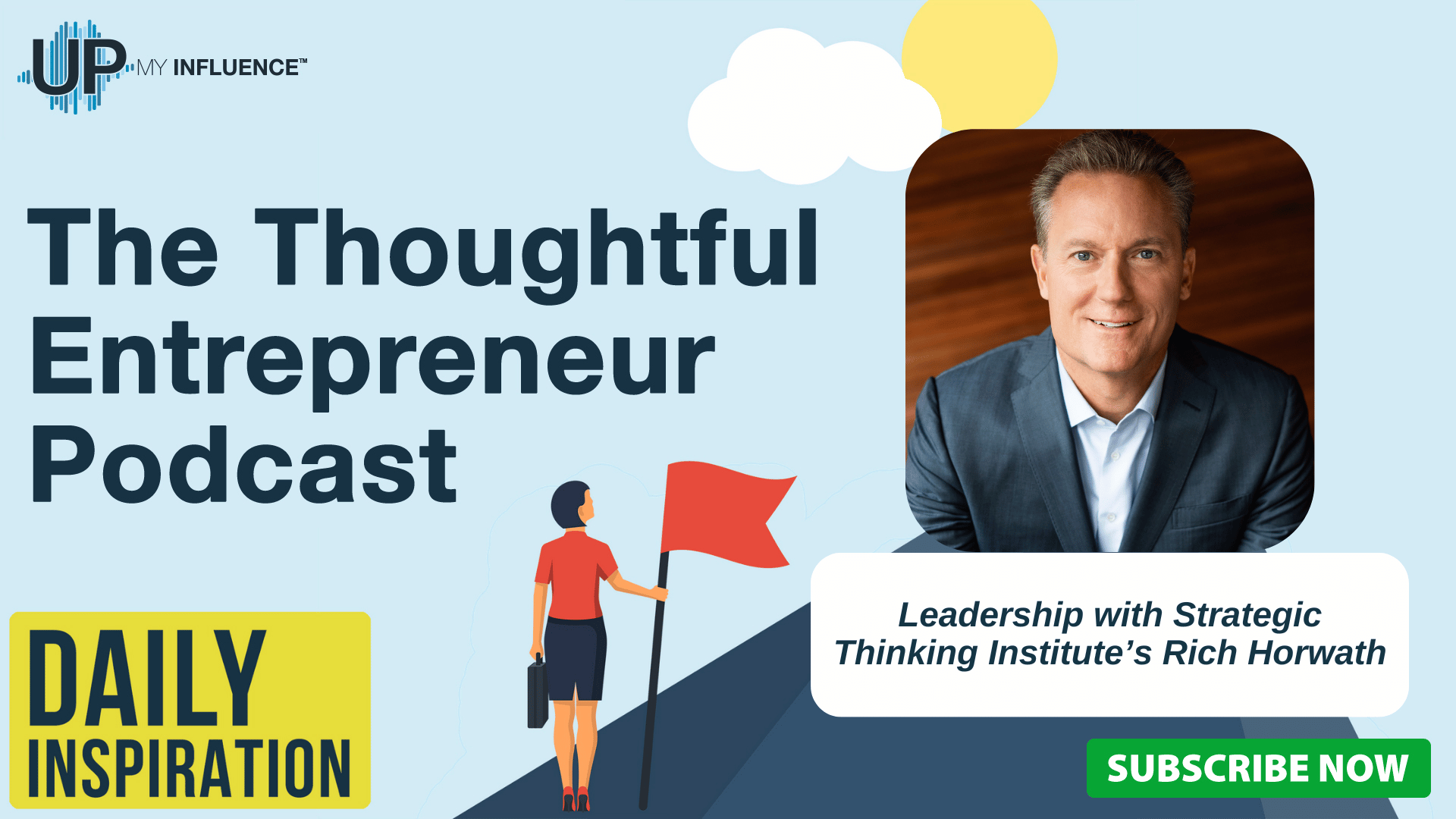THE THOUGHTFUL ENTREPRENEUR PODCAST
In this episode of the Thoughtful Entrepreneur, your host Josh Elledge speaks with the Founder & CEO of Strategic Thinking Institute, Rich Horwath.

Rich Horwath's Strategic Thinking Institute is a beacon for senior leaders who aspire to think, plan, and act strategically daily. The institute's primary focus is to help these leaders establish a cohesive strategic direction.
Rich emphasizes the importance of a strategy scaffold, which comprises three elements: purpose (mission, vision, values), business model, and plan (goals, objectives, strategies).
Rich provided valuable insights on how leaders can determine whether they are on track with their strategy. He stressed the importance of understanding one's position in the market and tailoring strategies accordingly.
He drew a clear distinction between market leaders, who aim to defend their position and attract new customers, and challengers, who focus on converting new users and capitalizing on the weaknesses of more prominent competitors.
Rich also discussed his approach to strategic coaching and his newest book, “Strategic: The Skill to Set Direction, Create Advantage, and Achieve Executive Excellence.” He emphasized the importance of customizing strategic tools for each team or business based on their specific needs and goals.
Key Points from the Episode:
- Introduction of Rich Horwath and the Strategic Thinking Institute
- Importance of cohesive strategic direction
- Elements of a strategy scaffold: purpose, business model, and plan
- Identifying if leaders are off track or on track with their strategy
- Different strategies for market leaders and challengers
- Organizational resistance and the need for employee buy-in
- Concept of organizational flow and breaking down silos
- Key message for leaders: setting strategic direction
- Customizing strategic tools for specific needs and goals
- Importance of ongoing strategic development and individual coaching
- Rich's books: “Strategy Man” and “Strategic“
About Rich Horwath:
Rich Horwath, CEO of the Strategic Thinking Institute, is a renowned strategy facilitator, advisor, and coach. As a New York Times and Wall Street Journal bestselling author, his latest book, “STRATEGIC,” delves into setting direction, creating advantage, and achieving executive excellence.
Over two decades, he's aided over a quarter million leaders in honing their strategic thinking. A former Chief Strategy Officer and strategy professor, Rich has graced ABC, NBC, CBS, and FOX TV.
Having crafted 700+ proprietary resources on strategic thinking, he's consulted for significant entities like ESPN, Google, and FedEx. His expertise has earned him acclaim, with Chief Executive Magazine dubbing him the “world's foremost expert on strategic thinking.”
Featured in Fast Company, Forbes, and the Harvard Business Review, Rich Horwath's vision is to teach the art of being strategic globally.
About Strategic Thinking Institute:
The Strategic Thinking Institute, led by President and CEO Rich Horwath, is committed to enhancing strategic thinking skills across managerial levels. Their focus is on fostering profit growth, productivity increases, and the establishment of competitive advantages.
With a global reach, STI collaborates with top-tier companies in the U.S., Europe, and the Asia-Pacific region to cultivate strategic thinking, formulate plans, and set direction.
STI offers a comprehensive range of services, including strategy consulting, training, keynote speeches, and counsel. The institute has empowered over 50,000 managers worldwide to bolster their strategic thinking capabilities. Through their strategic initiatives, STI plays a pivotal role in shaping organizational success on an international scale.
Tweetable Moments:
08:55 – “The number one role of a leader is setting strategic direction. If you want to set good direction as a leader, all you have to remember are three A's: acumen, allocation, and action.”
Apply to be a Guest on The Thoughtful Entrepreneur:
https://go.upmyinfluence.com/podcast-guest
Links Mentioned in this Episode:
Want to learn more? Check out Strategic Thinking Institute website at
https://www.strategyskills.com/
Check out Strategic Thinking Institute on LinkedIn at
https://www.linkedin.com/company/strategic-thinking-institute/
Check out Rich Horwath on LinkedIn at
https://www.linkedin.com/in/richhorwath/
Check out Rich Horwath on Instagram at
https://www.instagram.com/richhorwathceo/
Check out Rich Horwath on Twitter at
https://twitter.com/RichHorwath
Don’t forget to subscribe to The Thoughtful Entrepreneur and thank you for listening. Tune in next time!
More from UpMyInfluence:
We are actively booking guests for our The Thoughtful Entrepreneur. Schedule HERE.
Are you a 6-figure consultant? I’ve got high-level intros for you. Learn more here.
What is your #1 Lead Generation BLOCKER? Take my free quiz here.
Want to learn more about all the podcasts managed by UpMyInfluence? Opt in here.

